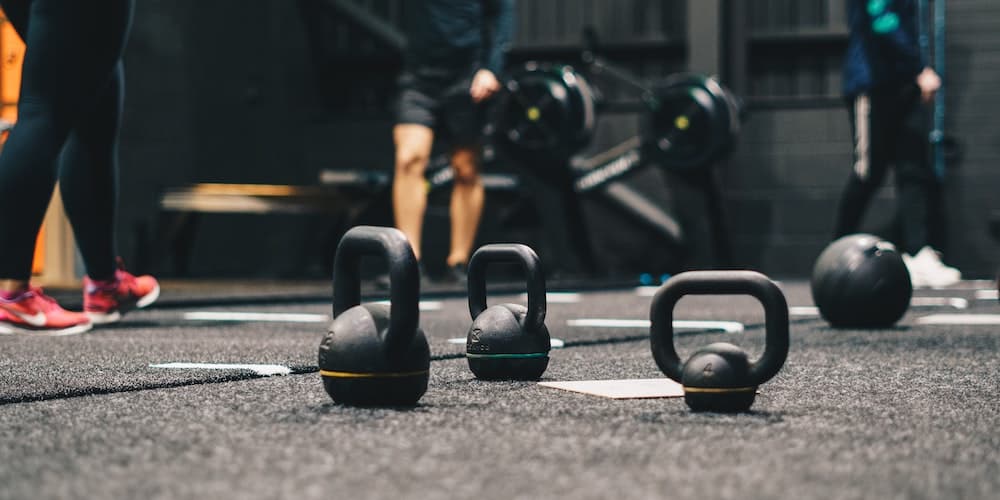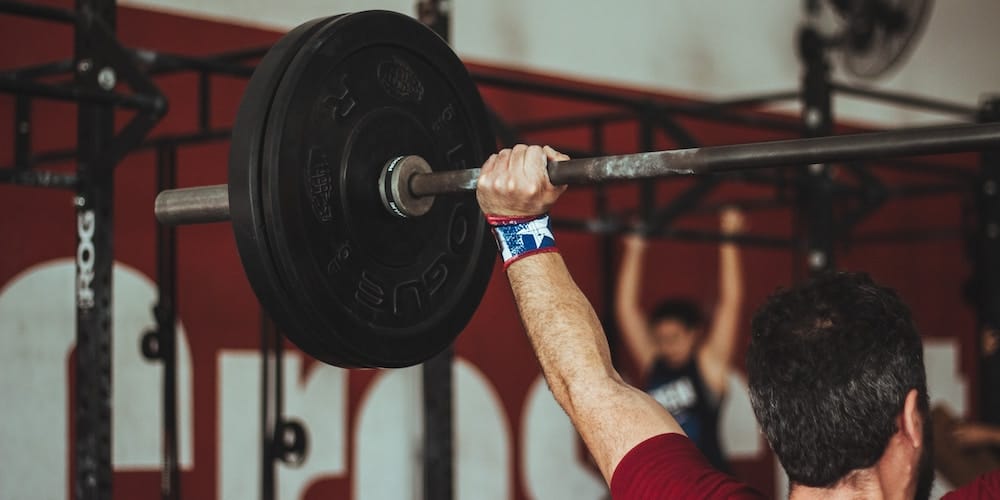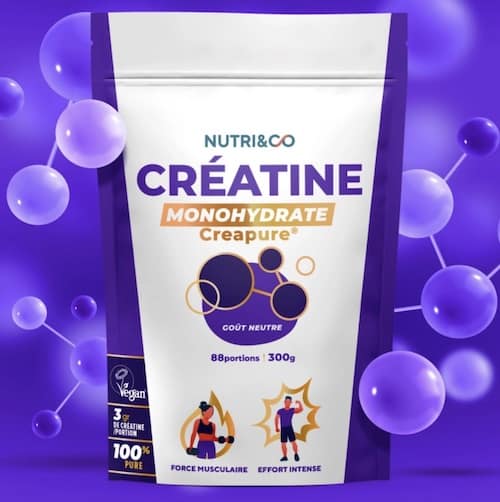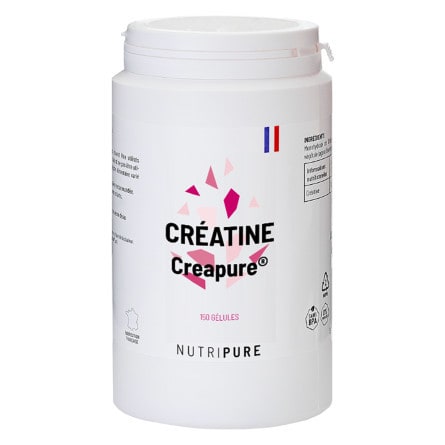Nous avons analysé 12 produits vendus sur Internet selon 4 critères, et avons retenu ces deux creatines :
Meilleure créatine en poudre 🥇
> Créatine Monohydrate Creapure® – Nutri&Co
Best creatine in capsules
> Creatine Creapure® – Nutripure
Best creatines
Our selection criteria
- Form: creatine is available in powder (more economical) and in capsules (more convenient).
- Type: creatine monohydrate is recommended due to its active ingredient content and the number of clinical studies performed on this type.
- Certificates of analysis: verification of the absence of heavy metals and suspicious solvents
- Price / dose: this is the price per recommended dose of creatine per serving (3.4 g).
- Customer reviews: these customer reviews on the product are retrieved from the brand’s website, review sites, or Amazon.
- Our opinion on the brand: following the supplement brand tests we conduct each month.
All supplements below are manufactured in the European Union, contain 100% creatine and are gluten-free.
# Best powdered creatine 🥇
Brand : Nutri&Co
Form : powder
Type : creatine monohydrate
Certificates of analysis : compliant
Price / dose : €0.34
Customer reviews : 4.8/5 (ekomi.fr)
We selected Nutri&Co’s creatine powder because it is made of 100% Creapure®, the global benchmark for purity and quality. It is the only creatine produced in Europe (specifically in Germany).
Creatine monohydrate is also the form whose effectiveness has been the most documented by scientific studies (more than 200).
At €0.34 per serving, this creatine offers excellent value for money, which is a real plus for athletes who want to take it every day. A sachet contains 300 grams of creatine, which represents 88 servings (more than 2 months of use).
We like the Nutri&Co brand because it is reliable and transparent (read our full review to learn more). We also note that customer reviews are very good.
This company is based in Aix-en-Provence and places particular importance on the quality of the active ingredients in its products.
# Best creatine in capsules
Brand : Nutripure
Form : capsules
Type : creatine monohydrate
Certificates of analysis : compliant
Price / serving : 0.66€
Customer reviews : 4.5/5 (nutripure.fr)
We selected Nutripure’s creatine because it offers quality perfectly equivalent to Nutri&Co’s, but in capsule form, which can be more convenient for some people.
It is also a Creapure® creatine, a monohydrate type, 87% pure and made in Germany.
The price per serving is €0.66, which remains reasonable. A bottle contains 150 capsules, representing 1 month of consumption.
Nutripure was co-founded by a high-level athlete, a five-time world karate champion. The ingredients offered by the company are of high quality and minimize the use of food additives.
Manufacturing is French and the prices are fair (see our complete review of the brand).
What is creatine?
Creatine is a derivative of an amino acid naturally present in our body and in our diet.
The body is able to synthesize it in the liver and kidneys from three amino acids: glycine, arginine and methionine. It is then stored in the brain and muscles in the form of phosphocreatine.
Its role is to act as a precursor to ATP (Adenosine Triphosphate), a molecule that provides energy to muscle fibers.
During intense physical exercise, muscles use ATP to produce energy. However, these ATP stores are very limited and must be replenished quickly.
Stored phosphocreatine can quickly regenerate ATP, allowing muscles to continue functioning for longer periods and with greater intensity.
Creatine supplementation may help promote the replenishment of ATP during short bouts of intense exercise and accelerate phosphocreatine synthesis after exertion. This is why it is prized in disciplines such as bodybuilding and fitness.
Our creatine needs and which foods to find it in
Creatine is found mainly in animal-derived products such as red meat, poultry, fish, and offal, at about 5 g per kg of raw meat. Note that cooking destroys part of the creatine.
It is also found in some plant-based foods but in smaller amounts, notably in legumes, the quinoa, mushrooms, and almonds.
If you consume meat and fish daily, about 1 g of creatine per day is provided by the diet and 1 to 2 g are synthesized by the body.
The amount of creatine stored daily is therefore 2 to 3 g per day. This amount is reduced if protein intake is low, especially in vegetarians.
Depending on your sporting activity, your body type, and your diet, your creatine needs vary. They are nonetheless estimated at about 4 to 5 g on average for an effect on strength and recovery.
Benefits of taking creatine
If you do strength sports such as weightlifting and bodybuilding, or sports that require short, intense efforts such as sprinting and cross-training, taking creatine as a dietary supplement is worthwhile.
Indeed, according to my research, creatine supplementation can:
- an increase in muscle strength, by increasing the energy stores used by muscles through higher phosphocreatine reserves. This is shown by this study.
- an increase in physical performance and improved resistance to fatigue. By reducing the rate of ATP breakdown, allowing muscles to work at full power for longer.
- an increase in muscle mass by promoting protein synthesis.
- an improvement in recovery after exercise by accelerating the rate of ATP synthesis at meals and glycogen storage.
- an increase in muscle volume by promoting water retention in the muscle, as observed in this study conducted over 4 weeks on athletes.
Creatine may have a reputation as a doping substance. Rest assured, this is not the case. It is certainly a source of energy for muscle, but it has no effect on the hormonal system.
The right time to take creatine
If you do endurance sports like swimming or running, I do not recommend creatine supplementation. However, as we’ve seen, it can be beneficial for people who practice strength and highly explosive sports such as weightlifting, bodybuilding, or sprinting.
In this case and based on this publication, I recommend an additional maintenance intake of 2 to 3 g per day.
I recommend taking creatine after training because that’s when your body will absorb it best. However, on non-training days, it’s better to take it with meals.
I discourage taking creatine before a workout because it could negatively affect digestion and blood sugar. As a result, it may impair performance.

My purchase criteria
1. Type of creatine
On the sports supplement market you’ll find many types of creatine. The most common and most studied type remains creatine monohydrate.
This form contains 88% creatine and 12% water, has good solubility, and is inexpensive to produce. It is generally well tolerated, but mild digestive issues at the start of supplementation are still possible.
You will encounter other forms of creatine such as creatine citrate, creatine phosphate, creatine malate, or creatine tartrate. These sometimes claim better solubility and greater effectiveness.
However, these forms are more expensive and less studied. Moreover, few robust studies have been able to demonstrate greater efficacy than creatine monohydrate.
It is also possible to find blends of different types of creatine or creatines combined with amino acids like beta-alanine or minerals like magnesium. Their aim is to enhance creatine’s effectiveness. Personally, I do not find this necessary.
In any case, it’s best to consult a competent sports professional who can recommend the right product for your situation.
2. Quality label
I recommend turning to Creapure®, one of the best creatine brands. This German laboratory has chosen to manufacture a 100% pure creatine monohydrate.
It does not contain unnecessary byproducts, as are often found in standard creatine monohydrate on the market. Its quality and traceability are optimal.
3. Form of creatine
Creatine is generally marketed in powder, capsule, or tablet form.
Whatever its form, the effectiveness is the same. I therefore recommend choosing the one that best fits your daily routine, to ensure consistency in your intake.
Powder form is more economical, easy to mix into a drink, and dissolves better. Capsule form, on the other hand, is easier to carry and allows for more precise dosing.
Contraindications to taking creatine
There is generally no danger associated with using creatine as a dietary supplement, particularly if you follow the recommended doses.
In cases of excess, there may be side effects such as:
- muscle cramps
- joint pain
- stomach issues
Creatine promotes water retention in muscles, which can be a problem for people with kidney disease. That is why it is very important to stay well hydrated.
I recommend consulting a doctor in case of health problems.
As a precaution, creatine is not recommended for children, pregnant or breastfeeding women. The same applies to people with kidney conditions.
To summarize
To make sure you choose the best creatine, check:
- The type : the most common and best-studied type remains creatine monohydrate.
- The label : Creapure® guarantees creatine free of impurities.
- The form : powder is more economical, capsules are more precise, but the effectiveness remains the same.





